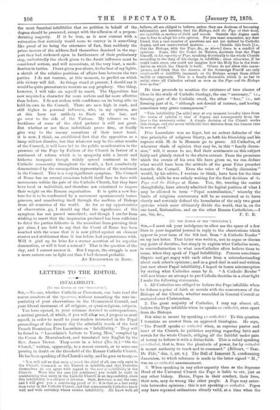LETTERS TO THE EDITOR.
SIR,—No one, whether Catholic or Protestant, can have read the recent numbers of the .tipeenitor, without remarking the rare im- partiality of your observations on the (Ecumenical Council, and your liberal treatment of all religious, or quasi-religious, subjects. You have opened, in your columns devoted to correspondence, a neutral ground, of which, if you will allow me, I propose to avail
myself, in order to recall to your readers interested in the Papal proceedings of the present day the admirable words of the bold French Dominican Pere Lacordaire on " Infallibility." They will be found in " Lacordaire's Letters to Young Men," compiled by the Count de Montalembert, and translated into English by the Rev. James Trevor. They occur in a letter (No. ix.) " On the Church," written, apparently, to a recent convert, or to some one pausing in doubt on the threshold of the Roman Catholic Church.
He has been speaking of the Church's unity, and he goes on to say,—
" You will tell us that unity ofmind, the chief of all, can only exist in the Church, inasmuch as the Church is infallible, and that Catholics themselves do not agree with regard to the seat of infallibility in the Church. Were this the case [he continues] you would be right in maintaining that unity in the Catholic Church is an impossibility, since this infallibility is a subject of division. Such, however, is not the case, and I will give you a convincing proof of it: it is that as a fact unity does exist in the Catholic Church, and that consequently Catholics know well and with certainty where resides infallibility. All know well, all
INFALLIBILITY.
[TO THE EDITOR OF THE "SPECTATOR.") •
believe, all are obliged to believe, unless they are desirous of becoming schismatics and heretics, that the Bishops, with the Pope at their' ead, are infallible in matters offaith and morals. Outside this dogma each one is free to adopt his own opinion. For you must remember, my dear friend, that a vast number of questions are not yet defined by Catholic dogma, and are controverted matters Outside this truth [i.e., that the Bishops, with the Pope, &o., as above] there is a conflict of opinions. Some, like the Count de Maistre, maintain that the Pope himself, in his capacity of Pope, speaking doctrinally to the whole Church according to the duty of his charge, is infallible ; since otherwise, if he could teach error, one could not imagine how the Holy See is the foun- dation on which the Church is built. Others do not allow this conse- quence, and think that the decrees of the Sovereign Pontiff are only &reformable or infallible inasmuch as the Bishops accept them either tacitly or expressly. This is a family discussion, which is no bar to unity, since all Catholics submit as soon as the Pope and the Bishops have spoken."
He then proceeds to mention the existence of two classes of ideas in the study of Catholic theology, the one " necessary," i.e.,
forming part of the Catholic creed, the other " free," i.e., not forming part of it, " although not devoid of interest, and having
sometimes very grave consequences."
" This infallibility [ho adds] may at any moment transfer ideas from the realm of opinion to that of dogma, and consequently from, the free to the necessary order. A simple decision of the Church works this change, and she never withholds that decision from the human race in case of need."
Pere Lacordaire was no bigot, but an ardent defender of the time principles of religious liberty, as both his friendship and his rupture with M. de la Mennais go to prove. All Catholics, of whatever shade of opinion they may be, in this " family discus- sion," will, it seems to me, find their sentiments on this subject fairly and plainly stated in the above extract. From the premisses which the events of his own life have given us, we can deduce what would have been the attitude of the great Friar preacher towards the Council. Even the voice of "family discussion" would, by his advice, I venture to think, have been for the time hushed, while he was calmly waiting for the final decisions of the Pope and the Bishops at Rome. You, Sir, treating the matter thoughtfully, have already admitted the logical position of what I may be allowed to term "Papal centralization," whereby the
limits of religious controversy will be so narrowed as to leave clearly and certainly defined the boundaries of the only two great systems which must ultimately divide the world, that is, on the
one hand, Rationalism, and on the other Roman Catholicism.—I


































 Previous page
Previous page